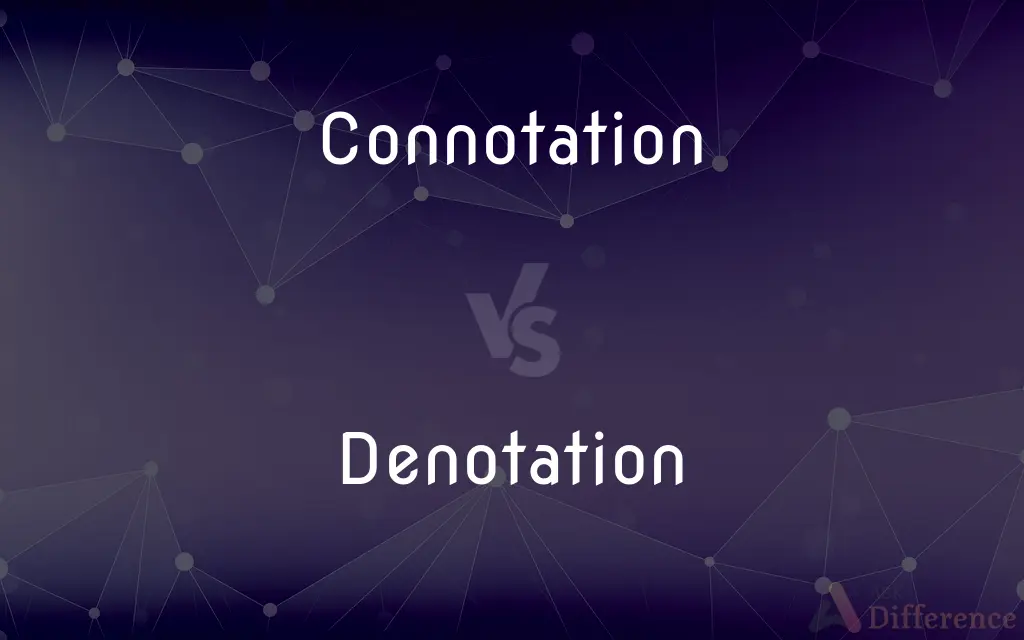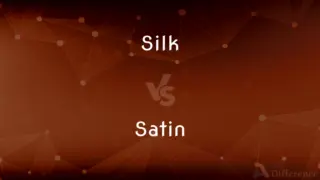Connotation vs. Denotation — What's the Difference?
Edited by Tayyaba Rehman — By Fiza Rafique — Updated on September 25, 2023
Connotation refers to the emotional or cultural associations and implications. Denotation is the strict, literal meaning of a word, devoid of emotional or cultural associations.

Difference Between Connotation and Denotation
Table of Contents
ADVERTISEMENT
Key Differences
Connotation influences the tone and mood of a text or conversation, adding layers of meaning. Denotation provides the basic, factual definition of a word in a given context.
Connotations can lead to subtle nuances in communication, influencing how a message is perceived. Denotations ensure clarity and precision in communication, providing a common understanding of words.
Comparison Chart
Definition
Emotional or cultural associations of a word
Literal, dictionary meaning of a word
Influence on Tone
Shapes the tone and mood of a message
Provides a factual, neutral foundation
Example
"Clever" (Positive connotation)
"Clever" (Intelligent or skillful)
ADVERTISEMENT
Communication Impact
Adds depth and subtlety
Ensures clear, unambiguous communication
Compare with Definitions
Connotation
Emotional or cultural associations of a word.
She has a sweet connotation in our hearts.
Denotation
The primary, objective definition of a term.
In mathematics, the denotation of 'pi' is approximately 3.14159.
Connotation
Subtle, implied meanings associated with a word.
His statement had a negative connotation.
Denotation
Exact, factual meaning without added implications.
The denotation of 'run' is to move swiftly on foot.
Connotation
Additional meanings and implications beyond the literal definition.
The word 'freedom' carries a powerful connotation of liberty.
Denotation
The core, universally accepted definition of a word.
The denotation of 'book' is a written or printed work.
Connotation
The unspoken, nuanced message a word conveys.
The connotation of 'vintage' is nostalgic.
Denotation
Denotation is a translation of a sign to its meaning, precisely to its literal meaning, more or less like dictionaries try to define it. Denotation is sometimes contrasted to connotation, which includes associated meanings.
Connotation
Emotional resonance linked to specific words.
The connotation of 'adventure' excites me.
Denotation
The literal or primary meaning of a word, in contrast to the feelings or ideas that the word suggests
Beyond their immediate denotation, the words have a connotative power
Connotation
A connotation is a commonly understood cultural or emotional association that any given word or phrase carries, in addition to its explicit or literal meaning, which is its denotation. A connotation is frequently described as either positive or negative, with regard to its pleasing or displeasing emotional connection.
Denotation
The act of denoting; indication.
Connotation
The act or process of connoting.
Denotation
Something, such as a sign or symbol, that denotes.
Connotation
An idea or meaning suggested by or associated with a word or thing
Hollywood holds connotations of romance and glittering success.
Denotation
Something signified or referred to; a particular meaning of a symbol.
Connotation
The set of associations implied by a word in addition to its literal meaning.
Denotation
The most specific or direct meaning of a word, in contrast to its figurative or associated meanings.
Connotation
(Logic) The set of attributes constituting the meaning of a term; intension.
Denotation
The act of denoting, or something (such as a symbol) that denotes
Connotation
(semantics) A meaning of a word or phrase that is suggested or implied, as opposed to a denotation, or literal meaning. A characteristic of words or phrases, or of the contexts that words and phrases are used in.
The word "advisedly" has a connotation of "wisely", although it denotes merely "intentionally" and "deliberately."
The word "happy" has a positive connotation, while "sad" has a negative connotation.
Denotation
The primary, surface, literal, or explicit meaning of a signifier such as a word, phrase, or symbol; that which a word denotes, as contrasted with its connotation; the aggregate or set of objects of which a word may be predicated.
The denotations of the two expressions "the morning star" and "the evening star" are the same (i.e. both expressions denote the planet Venus), but their connotations are different.
Connotation
(logic) The attribute or aggregate of attributes connoted by a term, contrasted with denotation.
The two expressions "the morning star" and "the evening star" have different connotations but the same denotation (i.e. the planet Venus).
Denotation
The intension and extension of a word
Connotation
The act of connoting; a making known or designating something additional; implication of something more than is asserted.
Denotation
(semantics) Something signified or referred to; a particular meaning of a symbol
Connotation
A meaning implied but not explicitly denoted by some word or expression, which may be understood in addition to the explicit primary meaning.
Denotation
(computer science) Any mathematical object which describes the meanings of expressions from the languages, formalized in the theory of denotational semantics
Connotation
The full set of necessary properties possessed by all the objects within the extension of a term; the intensional meaning of a term, which determines the objects to which the term applies; the intension of a term.
Denotation
(media studies) A first level of analysis: what the audience can visually see on a page. Denotation often refers to something literal, and avoids being a metaphor.
Connotation
What you must know in order to determine the reference of an expression
Denotation
The marking off or separation of anything.
Connotation
An idea that is implied or suggested
Denotation
The act of indicating or pointing out by name
Denotation
The most direct or specific meaning of a word or expression; the class of objects that an expression refers to;
The extension of `satellite of Mars' is the set containing only Demos and Phobos
Denotation
Literal, dictionary meaning of a word.
The denotation of 'cat' is a small, domesticated mammal.
Denotation
The fundamental, straightforward interpretation of a word.
The denotation of 'water' is a transparent liquid.
Common Curiosities
What is connotation?
Connotation refers to the emotional or cultural associations and implications of a word beyond its literal definition.
How do connotation and denotation affect communication?
Connotation adds layers of meaning and influences tone, while denotation ensures clarity in communication.
How can one identify connotations in a text?
Look for emotional undertones and implied meanings associated with words.
Provide an example of a word with a negative connotation.
"Stubborn" carries a negative connotation of inflexibility.
In what situations is denotation more important than connotation?
Denotation is vital in legal contracts and scientific reports where precision is paramount.
What is denotation?
Denotation is the strict, literal meaning of a word, devoid of emotional or cultural associations.
What happens when there is a mismatch between connotation and denotation in a text?
It can lead to confusion or misinterpretation of the intended message.
Why is understanding connotation important in advertising?
Advertisers use connotations to create associations and appeal to emotions in consumers.
How can connotations impact literary works?
Connotations can shape characters' personalities and create mood in literature.
Why is denotation crucial in technical writing?
Denotation ensures precision and clarity in technical or scientific documents.
Give an example of a word with a positive connotation.
"Eloquent" suggests a positive connotation of being articulate.
How do poets often use connotation in their works?
Poets use connotations to evoke emotions and create vivid imagery in their poetry.
Give an example of a word with both positive and negative connotations.
"Adventurous" can have a positive connotation of bravery and a negative one of recklessness.
What is the relationship between connotation and culture?
Connotations can vary across cultures, influencing how words are perceived and used.
Can connotation change over time?
Yes, connotations can evolve based on societal shifts and changing cultural norms.
Share Your Discovery

Previous Comparison
Accountant vs. Counter
Next Comparison
Silk vs. SatinAuthor Spotlight
Written by
Fiza RafiqueFiza Rafique is a skilled content writer at AskDifference.com, where she meticulously refines and enhances written pieces. Drawing from her vast editorial expertise, Fiza ensures clarity, accuracy, and precision in every article. Passionate about language, she continually seeks to elevate the quality of content for readers worldwide.
Edited by
Tayyaba RehmanTayyaba Rehman is a distinguished writer, currently serving as a primary contributor to askdifference.com. As a researcher in semantics and etymology, Tayyaba's passion for the complexity of languages and their distinctions has found a perfect home on the platform. Tayyaba delves into the intricacies of language, distinguishing between commonly confused words and phrases, thereby providing clarity for readers worldwide.














































